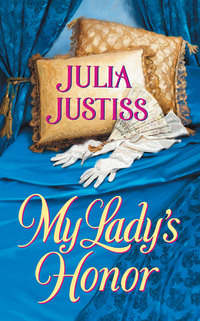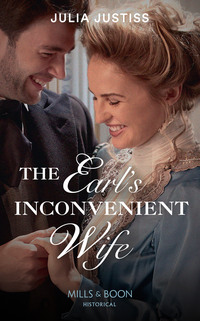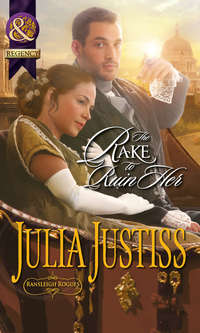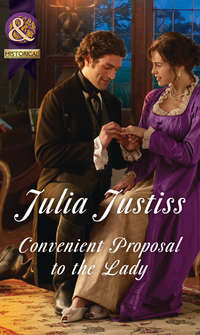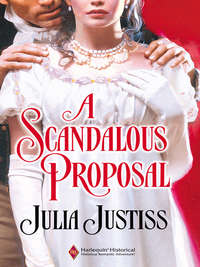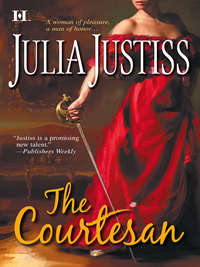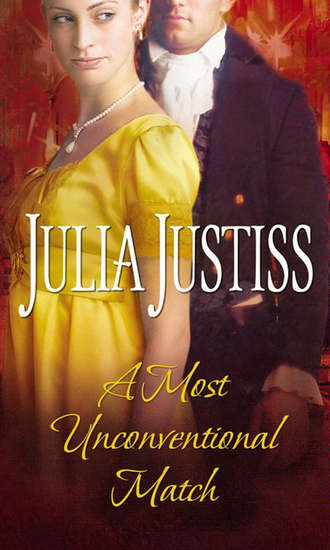
Полная версия
A Most Unconventional Match

PRAISE FOR JULIA JUSTISS
The Untamed Heiress
“Justiss rivals Georgette Heyer in the beloved The Grand Sophy by creating a riveting young woman of character and good humour…The horrific nature of Helena’s childhood adds complexity and depth to this historical romance and unexpected plot twists and layers also increase the reader’s enjoyment.”
—Booklist
The Courtesan
“With its intelligent, compelling characters, this is a very well-written, emotional and intensely charged read.”
—Romantic Times BOOKReviews
“I would be honoured to have your escort,” Elizabeth said softly, her blue gaze catching his and holding it.
Hal’s chest expanded until he wasn’t sure he’d be able to grab a breath. Of course, Elizabeth was merely grateful for his help. But the very thought of escorting her, of walking into some public place with her hand on his arm…
Elizabeth Lowery beside him in a carriage, her rose scent wrapping around his head. Her golden curls brushing his shoulder, the warmth of her body radiating towards him, her lips, the delicious curves of her body but inches away…The rush of images made him dizzy with anticipation and desire.
He tried to beat his thoughts back into order. She saw him not as a man, but as someone safe and companionable. He mustn’t make of it any more than that.
A Most Unconventional Match
Julia Justiss

www.millsandboon.co.uk
Also available by Julia Justiss
SEDUCTIVE STRANGER
THE COURTESAN
THE THREE GIFTS
THE UNTAMED HEIRESS
ROGUE’S LADY
Prologue
London 1813
Leaning one broad shoulder against the wall, Hal Waterman exchanged an amused glance with Sir Edward Austen Greeves as they watched the bridegroom pacing in front of the hearth. ‘Wearing out the carpet, Nicky,’ Hal pointed out. ‘Give the bride’s family a distaste of you. Best get the ring on her finger first.’
Nicholas Stanhope, Marquess of Englemere and Hal’s best friend since their Eton days, sent him an irritated look. ‘I can’t imagine what’s taking so long. The priest arrived half an hour ago.’ Halting before a side mirror, he straightened the white rose in his buttonhole and tugged on his cravat.
‘Adjust that once more and you’re going to ruin it,’ Ned said. ‘I expect the ladies will be here shortly. Patience, my man! Every bride wants to look beautiful on her wedding day, even if she’s being married by special licence in a parlour instead of in church after a calling of the banns.’
Nicholas swung his gaze around to glare at Ned. ‘Don’t you dare imply there’s anything havey-cavey about this! You both know—’
‘We do,’ Hal interrupted. ‘Mortgage foreclosure and all that. Had to rescue her. Great lady, Sarah. Good choice.’ He nodded approvingly.
‘Must be eagerness for the wedding night that makes you so testy,’ Ned said. ‘You know we fully support your marrying Sarah and understand the necessity to do so immediately. And her family’s parlour might not be a church, but it’s just as handsomely appointed.’
Ned gestured around the room, indicating the side tables covered with lace cloths surmounted by silver candelabra, the large vases filled with greenery and white roses set beside the rows of chairs facing the fireplace, the mantel where a cross flanked by candles and more rose sprays created an improvised altar. ‘The ladies have outdone themselves.’
Though he’d resumed his nervous pacing, the tightness in Nicholas’s face loosened. ‘I want this day to be beautiful—for Sarah.’
‘Great lady,’ Hal repeated. ‘Wouldn’t mind marrying her m’self. If I wanted to marry. Don’t,’ he added.
‘Your mama still after you with her latest heiress in tow?’ Ned asked. ‘As much as she disparages you, you’d think she wouldn’t be so eager to try to drag you into the parson’s mousetrap.’
‘Wants to “improve” me,’ Hal said glumly. ‘Escaped her house, live in rooms, can’t work on me. Thinks a wife could.’
Nicholas halted long enough to thump Hal on the shoulder. ‘As if you needed improvement! You’re already the most stalwart companion a man could want.’
‘Hear, hear,’ Ned seconded and then shook his head. ‘Women.’
Giving his loyal friends a grateful smile, Hal gazed up at the altar. If he were forced to marry, Nicky’s soon-to-be bride would be almost his ideal choice, he thought. Lovely but not terrifyingly beautiful, competent, accomplished and kind, Sarah Wellingford never made him feel clumsy, tongue-tied and thick-witted the way the sharp-eyed, disdainful Diamonds of the ton his mother kept trying to foist on him did.
The way his beautiful, self-absorbed, society leader of a mother still did.
Since he had no intention, if and when he ever married, of wedding the sort of woman his mother preferred, he supposed he was fated to remain a disappointment to her. He shrugged off the dull ache produced by that old hurt.
‘Ah, here they come at last!’ Ned exclaimed as the parlour door opened.
The three men turned to watch as, led by the priest, the bridal party entered. First came the bride’s sisters, all adorned in white gowns trimmed with gold ribbon and cream rosebuds.
Meredyth, Cecily, Emma, Faith—Hal silently counted them off as they proceeded, trying to match faces to the names Nicky had given him. He’d just caught a glimpse of Nicky’s Sarah, resplendent in a gown of shimmering gold that made her silver-blonde hair glow, when the last sister in line turned toward him after easing the bride’s long skirt through the door.
Elizabeth, Hal thought, before his breath whooshed out and his brain stuttered to a halt.
She was an angel come to earth. Nothing else could explain such perfection, the beauty radiating from her so intensely, as if she were lit from within, that Hal could feel the warmth of it all the way across the room.
His stunned senses took in the pure spun gold of her hair, the pale coral of her cheeks, the rose-petal-soft look of her skin, the pink bow of a mouth with its full lower lip. A slightly pointed chin imbued her face with character, saved it from a mere oval’s bland symmetry.
And her eyes—blue as the summer waves of the lake on his country estate—impelled him to approach, as if he might discover the purpose of his life mirrored in the depths of those indigo pools.
An angel, his numbed wits repeated, or the reincarnation of the Botticelli Venus he’d seen in his well-travelled tutor’s pastel sketches.
Without conscious volition he walked toward her. She turned to him and smiled. A shock raced along his nerves from the top of his head to the soles of his feet.
She was the loveliest thing he’d ever beheld. Flawless. More beautiful even than his mother. His senses clamoured to touch her, taste her.
The realisation halted him in mid-stride.
Beautiful. Like his mother.
Lord in heaven, what was he thinking?
‘Hal, you escort Elizabeth,’ Ned murmured at his shoulder.
Escort her? Panic filled him and a cold sweat broke out on his brow, dampened his fingers. ‘Can’t!’ he replied in a strangled voice. Turning on his heel, he hurriedly paced to the furthest corner of the room.
Chapter One
Seven years later
Elizabeth Wellingford Lowery stood in her studio, brush in hand as she focused on the play of light across the flower in the vase on her worktable.
If she blocked out everything but the change of hues painted across the flower’s surface by the ebb and flow of the clouds in the sky outside her window, she might be able to keep out of consciousness for a little longer the bitter awareness that her life had crumbled into pieces.
She should be able to concentrate. She always painted this time of the morning, while the northern light remained steady, often becoming so absorbed in her work she forgot to stop for nuncheon.
How often had Everitt had to knock at that door and come in to collect her? Her heart squeezed in another spasm of grief as she recalled how he’d approach her, a teasing smile on his careworn face as he coaxed her to put down her brush and join him and their son David for a light mid-day meal.
She needed sustenance lest she slip away, as ethereal as the angel she appeared to be, he’d tell her, giving a loving tug to whichever strand of golden hair had escaped from the careless chignon into which she always twisted it.
But he was the one who had slipped away unexpectedly, taking her secure world with him.
She didn’t want to leave her studio, didn’t want to emerge into the tangle of duties beyond that door where she would have to face how much everything had changed. Even after a month, it was still too much to deal with, losing the kindest man who’d ever lived, who’d cared for her as if she were a precious object too fine and delicate for life on earth. Amelia Lowery, his elderly cousin who’d run their household with great efficiency, had been so incapacitated by the shock of Everitt’s death that, despite her own dismay and grief, Elizabeth had insisted the older woman give up her work and rest, and was therefore compelled to supervise tasks she’d never before had to oversee. To add to all of that, her entire family had gone on a long-delayed Grand Tour of the Continent barely a week before Everitt’s untimely death.
Aside from Amelia, Everitt had no other close relations, so, with her own family out of reach, she’d had no one to turn to, no one to help her bear the agony and the crushing responsibility. The only thing that made life endurable was being able to escape for a few hours every morning into this haven where she might blank from her mind all but the task of capturing with her brush the shape and substance and hue of the subject on her worktable.
Leaving David confined upstairs with his nurse. Her chest tightened again with grief and guilt. He was suffering too, her precious son, missing the papa who had doted on him as lovingly as he had doted on her. How could she help him when she couldn’t even help herself?
Tears welled in her eyes. Angrily she dashed them. Enough! She must pull herself out of this mire of grief and self-pity.
Some day soon she would do better, she promised herself. She’d wake to a new day without the constant, crushing weight of sadness on her chest. But for now, she would fix her mind only on the pure intensity of the hue in the flower before her.
A soft rap sounded at the door. For an instant, her spirits soared before the realisation settled like a rock in her gut. It couldn’t be Everitt. It would never again be Everitt.
She took a deep breath as Sands, her butler, bowed himself in. ‘Sorry to disturb you, madam, but…well, ’tis nearly a month since the beginning of the quarter and none of the staff have yet been paid. I’ve tried to stifle their grumbling, knowing how overset you’ve been, but it would be best if you would take care of compensating them.’
Elizabeth stared at Sands as if he’d been speaking in tongues. ‘Compensating them?’ she echoed blankly.
‘Normally the staff are paid at the start of every quarter,’ he explained patiently. ‘From a cache of coins the master kept in the locked chest in the bookroom.’
Naturally the servants would be wanting their money. But she’d had no idea about quarter day, nor had she the faintest notion what amounts were owed to the various members of her household.
Where could she find such information?
‘Madam?’ Sands prompted, recalling her attention. ‘I suppose I could go and ask Miss Amelia—’
‘No, you were right to come to me,’ Elizabeth interrupted. ‘Miss Lowery must have absolute rest, the physician said, if she is to recover from her attack. Of course everyone must be paid. Thank you for bringing the matter to my attention.’
His task accomplished, the butler turned to leave. ‘Oh, Sands!’ she recalled him. ‘Are there…any coins in the master’s chest at present?’
‘I have no idea, ma’am.’
‘Very well. And…do you know where my husband kept the key?’
‘I believe it is in the top-right drawer of his desk, Mrs Lowery.’
‘The…the amount of each person’s salary,’ she continued, painfully embarrassed by her ignorance. ‘Where might I find that?’
‘I expect it would be recorded in one of the ledgers on the master’s desk. Or his man of business might have a list. Would you like nuncheon served in an hour?’
Numbly she nodded. ‘In an hour. Yes, that would be fine.’
Sympathy in his eyes, the butler bowed again and went out, softly closing the door behind him. Elizabeth put down the brush she was still holding and sank into a chair.
What if she could not find the right ledger? What if there was no more money in the chest? How was she to obtain more? Oh, she did not want to deal with this!
If only, after her marriage to Everitt, she had insisted upon taking over some of the housekeeping duties Miss Lowery performed so well, she wouldn’t be this lost and unprepared. But one look at Amelia’s anxious face as she curtsied to Elizabeth when the newly-wedded couple arrived in London, the elderly spinster’s fingers twisting nervously in the fabric of her gown as she assured Elizabeth she quite understood the new bride would want to assume the management of her own household, and Elizabeth knew she could never wrest away from her husband’s poor relation the task that gave her such satisfaction. Especially not after Everitt confided to her that, the Lowery family possessing few close kinsmen, Amelia Lowery really had nowhere else to go.
Which brought her back to her present problem. She drew a shuddering breath.
It was only a list of employees. It was only a supply of coin. She could manage this. She could.
She’d look in the bookroom later. After nuncheon. For now, it was still painting time. She would remain here in this tranquil space for just a little longer. Smoothing her dull black skirts with a trembling hand, she rose and walked to her easel.
Before she could pick her brush back up, there was another knock at the door and Sands peeped in. ‘Sir Gregory Holburn to see you, madam. Do you wish to receive him?’
Her immediate response was to refuse, but she bit it back. She’d not met her late husband’s closest friend since the funeral more than a month ago, an event that, transpiring as it had in a blur of shock and misery, she scarcely remembered.
She hadn’t stepped a foot outside the house after returning from the interment. And since Everitt had cared more for collecting his antiquities than for mingling with society and she had cared about mingling in society not at all, with her family out of England, she’d not had any callers.
Sir Gregory had always treated her kindly, almost like an avuncular uncle. He would worry if she refused to meet him.
With a sigh she stripped off the full-length apron she wore to save her gown from the worst of the paint spatters. ‘Very well. Show him to the blue salon and tell him I’ll join him shortly.’
She walked to the small mirror over her workbench, frowning as she scraped back the loose strands of hair and tucked them into the chignon. Her face was pale, her eyes dull. Everitt would say she looked like she was going into a decline.
And so I am, without you, my dear, she whispered softly. Gritting her teeth against another swell of useless grief, she forced a smile to her lips and headed for the blue salon.
Sir Gregory jumped to his feet as she entered. A tall, well-built man in his fortieth year, his light brown hair as yet showed no trace of grey, unlike the silver-tinted locks of Everitt, who’d been five years his senior. Friends from their youth, the two men had grown up in the same area of Oxfordshire and attended the same college.
His light brown eyes lighting with pleasure, Sir Gregory took the hand she offered and kissed it. ‘How have you been getting on? I’m sorry not to have come sooner; estate business at Holburn Hall kept me tied up longer than I’d expected.’
‘I hope everything is going well there,’ Elizabeth said politely. Absently she wondered how Everitt’s neighbouring property, Lowery Manor, was faring. Since their marriage, they’d spent little time there, her husband preferring to reside in London where he might more easily acquire items for his collection.
‘Some difficulties with the planting, but well enough.’ Eyeing her more closely, he shook his head. ‘You look tired and careworn. Is Miss Lowery still confined to her bed and unable to assist? My poor Lizbet, I knew I should have come back sooner to check on you!’
‘How kind of you,’ Elizabeth replied, acknowledging his concern. ‘I’m afraid Miss Lowery is so far from recovered she must not even think of returning to her duties. I get on well enough, I suppose, though it is…difficult.’ She attempted a smile. ‘So many things to do! Reviewing menus, inspecting linens, checking silver, ordering coal—I had no idea how much was required to run a household. Did you know there are at least seventeen different recipes for preparing chicken?’
‘Seventeen?’ He chuckled. ‘Who would have thought?’
‘And where does one obtain the coin to pay one’s servants?’ She shook her head and sighed. ‘Miss Lowery and Everitt spoiled me dreadfully, I’m discovering.’
Holburn took her hand and patted it. ‘Dear lady, you are too young and lovely to trouble yourself with such trivialities! Now that I’ve returned to London, I do hope you’ll allow me to lift some of those burdens from your shoulders.’ Letting go of her fingers, he extracted a small purse from the pocket of his coat. ‘How much coin do you need for the servants?’
Tempting as it was to transfer all her tiresome duties into his willing hands, Elizabeth hesitated. Husband’s best friend notwithstanding, there was no link of kinship between them whatsoever. She could not but feel it went beyond the limits of what was proper to accept any of his kindly offered assistance. Without doubt, she knew she must not take money from him, even as a temporary loan.
‘That won’t be necessary, Sir Gregory, although I do thank you for offering. You must ignore my hen-hearted complaining! I shall learn to manage soon enough.’
‘You are sure?’ When she nodded, he continued, ‘Very well, I shall do nothing—this time. But my offer stands. I should be honoured to assist you in any way, at any time.’
As the mantel clock chimed the hour, she rose. David would be waiting for her, anxious for his nuncheon. ‘Should you like to join us for some light refreshment?’
‘You will take it with your son?’
‘Yes. By noon he’s grown quite peckish.’
‘I fear I must decline. Another time, perhaps?’
‘Of course.’ She escorted him from the parlour, secretly relieved he’d refused the invitation she’d felt obligated to offer. But Sir Gregory did not enjoy children—and David, perhaps sensing as children often do the attitude of the adults around them, most decidedly did not like Sir Gregory.
Some time this afternoon, she still must solve the riddle of paying her servants. Turning her visitor over to Sands, with a longing glance in the direction of her studio, Elizabeth walked upstairs to find her son.
In his bachelor quarters on the other side of Mayfair, Hal Waterman frowned at the notice printed in the newspaper. Having returned to London just last evening after spending two months monitoring a new canal project in the north, he was still sorting through the journals and correspondence that had accumulated in his absence.
Carrying the paper with him, Hal dropped into the chair by the fireplace where his valet Jeffers had left him a glass of wine, gratefully settling back against its wide, custom-designed cushions. Taller and more powerfully built than most of his countrymen, after his sojourn in assorted inns over the last weeks, he was thoroughly tired of trying to sleep in beds too short for his long legs and sit in wing chairs too narrow for his broad shoulders.
Scanning the notice again, he sighed. Mr Everitt Lowery, it read, of Lowery Manor in Oxfordshire and Green Street in London, unexpectedly expired in this city on the seventh inst.—almost six weeks ago now. Surviving him are his widow, Elizabeth, née Wellingford, and one son, David.
Elizabeth. Even now, seven years after his first glimpse of her at the wedding of his friend Nicholas to her sister Sarah, the whisper of her name reverberated through his mind, exciting a tingling in his nerves and a stirring in his loins.
Despite knowing Nicky’s wedding service had been about to begin, he’d barely been able to keep himself from bolting from the room that long-ago day. As it was, drenched in panic, he’d had to station himself as far from the enchanting Elizabeth as the confines of the parlour allowed, remaining at the reception afterwards only until he deemed it was politely possible to excuse himself.
Until he had encountered Elizabeth Wellingford, armoured by a lifetime of scornful treatment at the elegant hands of his beautiful mother, he’d thought himself immune to those pinnacles of perfect female form who so easily enslaved the men around them. Which, for Hal, made Elizabeth Wellingford the most dangerous woman in England. Even knowing what she could and probably would do to him, he’d still been…mesmerised.
The only sensible response was to stay as far away from her as possible. Over the intervening years, keeping that resolve turned out to be easier than he’d first feared, given that her sister had married his best friend. A few months after Nicky’s nuptials, shunning a Season, Elizabeth Wellingford had chosen to wed a family friend she’d known all her life, a gentleman more than twenty years her senior.
So, fortunately for his piece of mind, the bewitching Elizabeth had never joined the ranks of the hopefuls on the Marriage Mart, that small section of ton society in which his mother took greatest interest. Each Season Mama had inspected the new arrivals, choosing those she deigned to honour with her friendship, whom she would then parade before her son in the hope, mercifully thus far unrealised, of enticing—or coercing—him into marrying some woman of fashion who might be trusted to try to remake her overly tall, totally unfashionable only child.
A hopeless task, if Mama would just cease stubbornly refusing to concede the fact. In a society that prized dark, whipcord-slender men like that lisping poet Lord Byron, Hal was too big, too fair-haired, and, from his years of fencing and riding, too firmly muscled to ever be considered one of the ton’s dashing young blades.
Prizing comfort and utility above all, he had no patience for coats that required a valet to wrestle him in and out of them, shirts with points so high and stiff they scratched his chin or fanciful cravats that threatened to choke him whenever he swallowed.
And though, with Nicky’s help, he’d overcome the stuttering that had made his school years a misery, he would never be capable of uttering long flowing phrases full of the elegant compliments so beloved by ladies.
He sighed. He would always be an embarrassment to Mama and there was nothing to be done about it.
Shifting his gaze to the matter at hand, he looked back at the funeral notice he still held. So Elizabeth was now a widow. Too young and lovely a lady to be wearing black, he thought, a touch of sadness in his chest at the premature loss she had suffered. Then a startling, highly unpleasant realisation brought him out of his chair and sent him rushing to his desk.


